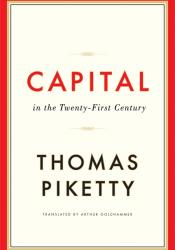Capital in the Twenty-First Century
Capital in the Twenty-First Century (French: Le Capital au XXIe siècle) is the magnum opus of socialist economist Thomas Piketty. In it, Piketty reimagines the ideas defined by Karl Marx in a modern perspective. His main thesis is that inequality is a feature of capitalism, and when the rate of return on capital is greater than the rate of economic growth, concentration of wealth occurs which causes socioeconomic instability (Piketty). His proposal to solve this problem is a necessity of state-interventionism, and he suggests augmenting a global wealth tax, but he recognizes such a tax to be wholly and feasibly impossible. The thesis, as quoted from the text, reads as follows,
“When the rate of return on capital exceeds the rate of growth of output and income, as it did in the nineteenth century and seems quite likely to do again in the twenty-first, capitalism automatically generates arbitrary and unsustainable inequalities that radically undermine the meritocratic values on which democratic societies are based.” (Thomas Piketty)
Thomas Piketty went on to recognize later that the warrants he used for his argument are not the only useful tools for the analysis of economic inequality under capitalist systems (About Capital in the Twenty-First Century). He comments in a later work, titled “About Capital in the Twenty-First Century”:
“For example, I do not view r > g as the only or even the primary tool for considering changes in income and wealth in the twentieth century, or for forecasting the path of inequality in the twenty-first century. Institutional changes and political shocks—which to a large extent can be viewed as endogenous to the inequality and development process itself—played a major role in the past, and it will probably be the same in the future.”
Piketty is reliable as he admits the fallible nature of some of his warrants. He also is unbiased in the pursuit of protecting a fair wealth divide by not instituting utterly impossible legislations. He recognizes that some solutions to the problems he details are not feasible legally because of potential loopholes. Some find that Piketty’s real subject to be “wealth,” and specifically household wealth, and not capital (Reid). Though, his main premise behind the work is that he is reimagining the foundations of Karl Marx’s ideas in Das Kapital. The work makes an excellent, knowledgeable, and apt response to the global economic circumstance of the period.
Piketty’s Capital in the Twenty-First Century opened the door for a modern critique of capitalist economics in a consumable, but knowledgeable, language for those from all spheres to think about potential solutions to this problem. While not any solutions have been found, at least globally, Piketty’s work reimagines the ideas initially presented by Friedrich Engels and Karl Marx. He also gives a voice to the people who are disadvantaged by the innate unfair nature of the capitalist system, and he goes further to suggest potential solutions for the problem (even recognizing their fallibility).
Related Links
The East Indian Rebellion of 1857
Works Cited
Reid, Lynette. “Piketty and the Body: On the Relevance of Wealth Inequality to Bioethics.” International Journal of Feminist Approaches to Bioethics, vol. 8, no. 2, 2015, pp. 250–65, https://doi.org/10.3138/ijfab.8.2.250. Accessed 1 May 2022.
Piketty, Thomas. About Capital in the Twenty-First Century. American Economic Review, Vol. 105, No. 5, May 2015. https://www.aeaweb.org/articles?id=10.1257/aer.p20151060 Accessed 30 April 2020.
Piketty, Thomas, and Arthur Goldhammer. Capital in the Twenty-First Century. Reprint, Belknap Press: An Imprint of Harvard University Press, 2017.

